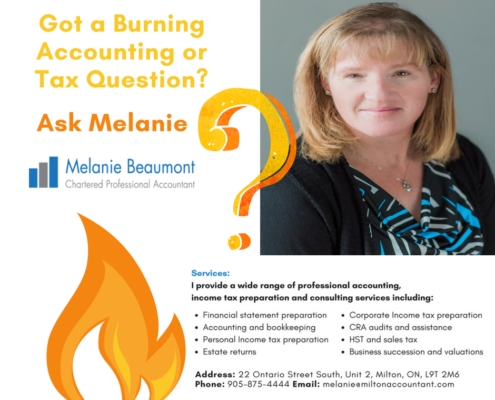#AskMelanie: What can I do when my spouse dies before me? 25 administrative items to tackle

I have written about various aspects of estate planning (see “related reads” below article) on my #AskMelanie blog. These difficult challenges are something we never want to face but is inevitable in our lifetime. This, of course, is never easy when you are dealing with the emotions associated with the death of a spouse or loved one. The stress of managing the CRA and end of life tasks can be time-consuming and confusing. My advice to you is to reach out and get help as soon as you can, and read here what to when facing this horrible life transition.
How to tackle the nitty-gritty of administration (Content provided by the Bean Counter blog)
Here are 25 administrative considerations for the surviving spouse (family, or executor of someone who dies):
1. Determine the deceased’s funeral wishes and if the funeral has been prepaid. If they have not made arrangements, you may unfortunately need to deal with this issue immediately while you are likely still in shock from your spouse’s or parent’s passing.
Key takeaway: Always ensure your funeral arrangements have been communicated while you are healthy.
3. Open the safety deposit box (“SDB”). You may need to open the SDB if the will is in the SDB or to prepare a list of the contents of the SDB with the representative of the bank.
Key takeaway: Please always ensure someone has a copy of the SDB key or knows where to find the key.
4. Meet with your or your spouse’s lawyer to review the will and understand any legal obligations such as advertising for creditors. In general, most spouses leave all if not the majority of their assets to their spouse. This generally makes things easy for tax, but that is not always the case. In addition, specific assets may often be left to the children or a charity, and those assets need to be dealt with in the near term.
5. Notify any beneficiaries of their entitlements under the will and request their personal information.
6. Meet with your or your spouse’s accountant, to ensure you are clear on the income tax obligations and the income filing requirements. If you or your spouse do not have an accountant, engage one. As noted above, I will address this issue in more detail in two weeks.
7. If the executor is someone other than the surviving spouse, ensure you contact them and advise them of their duties and determine whether they accept the appointment. Hopefully, they are already aware they would be appointed.
Key takeaway: always inform the people who will be your executors and provide them an estate organizer or similar document to provide them a roadmap of your assets. They will need to have a list of all your assets for probate and to ensure a full distribution is undertaken.
8. Your lawyer will advise you whether you will need to obtain a certificate of appointment of estate trustee with a will (probate), a very important step in Ontario and most other provinces.
Key takeaway: If you own shares in a private corporation, in certain provinces you can have a second will that removes these assets from probate. Ensure you discuss this with your lawyer if you do not already have a second will.
9. Collect any life insurance benefits.
10. Meet with your and your spouse’s financial planner, insurance agent or any other relevant advisor.
Key takeaway: Make sure you and your spouse meet all family advisors while both spouses are alive to create at least a basic comfort level.
11. Where the deceased was a controlling shareholder or ran a business, find out if there was a succession plan/disaster plan in place and that it is being followed. If the deceased did not create a plan, take control of the business in the short term and start looking for a manager to take over running the business. Your accountant can likely assist you in this.
Key takeaway: As I’ve written before, many business owners do not have a succession plan. This is the quickest way to lose some or a significant portion of your family’s worth when you die. Ensure you have a plan in place now or take steps to put one in place.
12. Apply for any government benefits the estate is entitled to, such as the CPP death benefit, survivor benefits and possibly child benefits.
13. Notify CPP/QPP and Old Age Security – at Service Canada – of your spouse’s death so they stop making payments.
14. Cancel the deceased’s driver’s licence, health card and other provincial documentation. (See this page for Ontario; each province will have a similar resource online.) Also make sure to cancel the deceased’s Social Insurance Number, passport and Nexus account as applicable.
15. Cancel credit cards in your spouse’s name, email and websites attached to them, and memberships in fitness clubs and organizations.
16. Change the name listed on utility, telephone and other bills.
17. Cancel personal health insurance premiums, cell phones and possible “fall alerts” if the deceased was elderly.
18. Transfer RRSPs, RRIFs and TFSAs.
19. Update your will or power of attorney (POA) if your deceased spouse was the beneficiary of all or some of your assets or your POA.
Key takeaway: It is important to update your will and especially your POA as soon as possible. I have seen many situations where the stress (broken heart) of spouse’s passing often creates a medical issue for the surviving spouse, so updating your POA is very important.
20. If you have real estate holdings in your spouse’s name or in a joint name, review the legal ownership and transfer issues with your real estate lawyer.
21. If your spouse had a vehicle, sell or transfer it and cancel or transfer the applicable auto insurance.
22. If the deceased had a domestic caregiver and the payroll account was in their name, you will need to issue final T4s, and possibly set up a new account in your name.
23. A sometimes-troublesome issue is family members taking items, whether for sentimental value or for other reasons. They must be made to understand that all items must be allocated according to the will or other means, and nothing can be taken.
Key takeaway: This is a very ticklish issue and needs to be handled delicately, but a family member “grabbing” a sentimental item can sometimes cause more dissension than monetary allocations.
24. For any jewellery and art not noted in the will, please note there are tax and probate consequences. See this blog I wrote on “Personal Use Property – Taxable even if the Picasso Walks Out the Door.”
25. Depending upon whether assets were left to beneficiaries other than the spouse, you may have to deal with a passing of accounts – commonly known as an official accounting of the estate’s assets – and possibly request a clearance certificate.
The administration and tax issue burdens are immense upon the death of a spouse. We have now covered the key items that the surviving spouse needs to deal with from an administrative angle. Look out for our next post, which will get you up to date on the taxation issues. For both areas, I strongly urge you to obtain professional legal and tax assistance.
Related reads:
I provide a wide range of professional accounting, income tax preparation and consulting services including:
• Financial statement preparation
• Accounting and bookkeeping
• Personal Income tax preparation
• Estate returns
• Corporate Income tax preparation
• CRA audits and assistance
• HST and sales tax
• Business succession and valuations
• Business Start-ups
Let’s get started in three easy steps:
- Learn more about me ⇨ Send me a LinkedIn connection invite
- Send me an Email ✉ Send me a message at melanie@miltonaccountant.com
- Call ✆ Give me a call locally at 905-875-4444
Get more advice from Melanie on her blog and connect with her on Facebook and Twitter as well!




Leave a Reply
Want to join the discussion?Feel free to contribute!